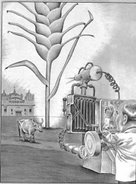Some irregularities in agricultural research procedure and exaggerations about achievements have been noted by the panel of advisers to the Gajendragadkar committee which went into the affairs of the Indian Council of Agricultural Research (ICAR).
The panel found that the field records of a potato experiment of the Indian Agricultural Research Institute (IARI) were "extremely unsystematic" and the manner of recording experimental data "quite unsatisfactory".
The panel noted a lapse of consistency about the protein and lysine content of the new wheat variety "Sharbati Sonoru" evolved by Dr. M. S. Swaminathan, now Director-General of the ICAR, and Dr. Verghese, which was claimed to have a lysine content as high as that of milk.
Dr. Swaminathan himself later quoted a lower lysine content for his new variety. In a paper presented to the International Atomic Energy Agency in 1969, he fixed the lysine content of Sharbati Sonora at 2.98 per cent, and that of Sonora-64 at 2.86. But in a 1970 article, Dr. Swaminathan reverted to the earlier figure of 4.61 per cent for Sharbati Sonora and 1.86 per cent, for Sonora-64.
The panel says: "There are many junior scientists in the IARI who, rightly or wrongly, feel that they are not free to publish a scientific finding because it does not suit somebody higher up, or that in fact unscientific data are being passed on to higher authorities in return for favours and promises. The existence of this feeling is most regrettable because it creates the condition for breeding of unscientific behaviour and practices if they do not already exist."
The panel says: "The phenomenon is not confined to ICAR institutions", but pervades the entire scientific and academic community in the country. At the root of it is the greed for bureaucratic power and love of a comfortable life. . . . Politicalisation of academic and scientific life has made the matter worst." —U.N.I.
The Times of India, (Bombay), 27-8-1972

No comments:
Post a Comment